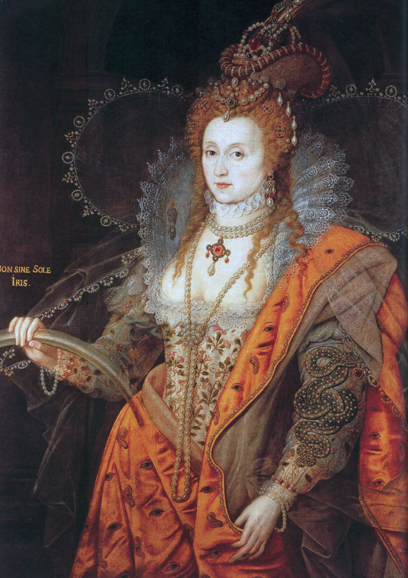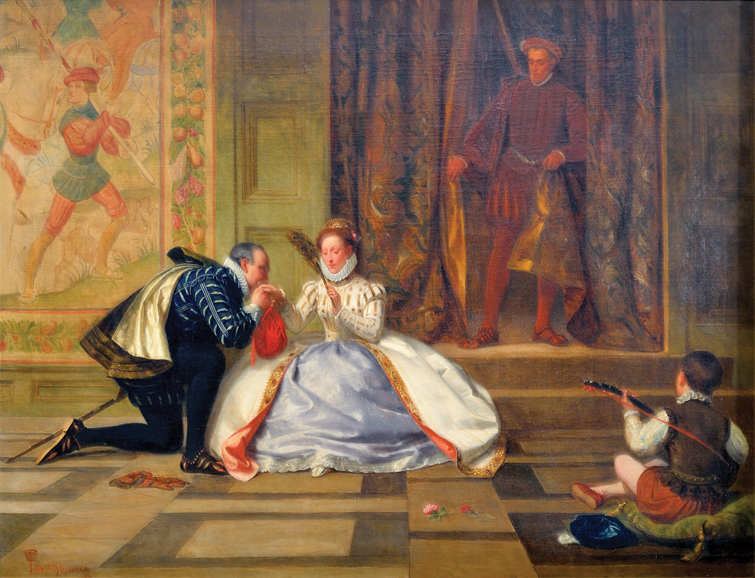The CW’s “Reign” — which casts Mary, Queen of Scots as an insipid Goody Two-Shoes and her mother-in-law Catherine de’ Medici and rival/cousin Elizabeth I as Mean Girls — is filled with anachronistic howlers. (Witness William Cecil, Elizabeth’s chief adviser, telling her that he knows how she hates the patriarchal system. Yeah, ’cause Renaissance queens really thought like that.)
But there was one moment recently that rang true. Cecil and the other members of her Privy Council urge Elizabeth to make her married childhood soulmate (and presumed lover) Robert Dudley ambassador to France, thereby ridding her of a sex scandal and them of a nettlesome political rival.
“I’ll take it under advisement,” she purrs, smiling sweetly — then proceeds to bind Dudley more tightly to her. Like her fictional counterpart, the real Elizabeth was determined to steer her own course through the tempest-tossed seas of sexual and political passion. “I will never be by violence constrained to do anything,” she told members of Parliament as they pressured her to marry or at least settle the succession.) Hot-tempered — particularly when it came to rival ladies, unruly subjects and willful suitors — and hot-blooded when it came to dashing men, Elizabeth knew the heart was essential. But a shrewd head still ruled that heart.
Perhaps that was because she understood that for a female ruler, passion and reason were — fairly or unfairly — as entwined as gender and governance. As an unmarried queen whose choice of husband could affect the direction of her island nation and tip the balance of power in Europe, she was the body in the body politic. To keep a newly Protestant England safe and its continental Roman Catholic antagonists — Spain, France and Rome — off-balance, Elizabeth played the dating game for all it was worth, dallying with King Erik XIV of Sweden and Archduke Charles von Habsburg of Austria, among others, through the sexting of the day — letters and portraits. (Virtually no suitor would woo her in person for fear of rejection, just as she remarked that they might find her wanting.) And so Elizabeth flirted from afar, flitting away whenever the matrimonial flame burned too hot.
That’s not surprising given her family history. Her father, Henry VIII — he of the six wives — had beheaded her mother, Anne Boleyn. She had seen stepmother after stepmother divorced (Anne of Cleves), beheaded (Katherine Howard) or dead in childbirth (Jane Seymour and Catherine Parr). Her sister Mary had humiliated herself and thrown England into turmoil with a loveless marriage to Philip II of Spain. Their first cousin, once removed, Mary, Queen of Scots, had as the widowed queen of France made two disastrous unions that cost her the throne of her native Scotland and, ultimately, her head. Small wonder that Elizabeth once observed: “Better beggar woman and single than queen and married.”
But her unique situation — married as she was to England — suited her temperamentally as well. Even if she weren’t an actual virgin — and there’s nothing to suggest historically that she wasn’t, despite such fanciful novels as Robin Maxwell’s “The Queen’s Bastard” and Philippa Gregory’s “The Virgin’s Lover — she was what Jungian analyst Esther Harding would later describe as a psychological virgin, one in herself. As she told the ever-pressuring Parliament: “I thank God I am endowed with such qualities that if I were turned out of the realm in my petticoat, I were able to live in any place in Christendom.” Unlike many women, even today, she didn’t need a man.
Which is not to say she didn’t want one. Her love for Robert Dudley — once her childhood playmate and later her Master of the Horse and the Earl of Leicester — endured the suspicious death of his first wife, which cast their relationship in a sinister light; his secret marriage to his second, which enraged Elizabeth; his ambitions; her flirtations; and her serious in-person courtship by the much younger François, duke of Alençon, the last son of the French queen regent, Catherine de’ Medici. When Alençon and Dudley died — in 1584 and ’88 respectively — Elizabeth mourned them sincerely, writing to Catherine of her son: “Madame, if you were able to see an image of my heart, you would see the portrait of a body without a soul.” As for Dudley, she locked herself in her room for days and kept his final missive to her in a bedside treasure box, inscribing it, “His Last Letter.”
Yet when she had the chance to marry either, she demurred, composing this poem, “On Monsieur’s Departure,” when she broke up with Alençon in 1581:
I grieve and dare not show my discontent;
I love, and yet am forced to seem to hate;
I do, yet dare not say I ever meant;
I seem stark mute, but inwardly do prate.
I am, and not; I freeze and yet am burned,
Since from myself another self I turned.
My care is like my shadow in the sun —
Follows me flying, flies when I pursue it,
Stands, and lies by me, doth what I have done;
His too familiar care doth make me rue it.
No means I find to rid him from my breast,
Till by the end of things it be suppressed.
Some gentler passion slide into my mind,
For I am soft and made of melting snow;
Or be more cruel, Love, and so be kind.
Let me or float or sink, be high or low;
Or let me live with some more sweet content,
Or die, and so forget what love e’er meant.
By then, Elizabeth had transformed herself into Gloriana, England’s virgin goddess, who understood that when you belong to yourself or the world, it’s hard to belong to one other person.
If that made her a hybrid — a female prince; a nontraditional woman, so be it.
“She was,” William Cecil observed, “more than a man and, in truth, something less than a woman.”
Yet every inch a queen.






